Effect of organic manure and bio-fertilizers on growth and yield parameters of strawberry (Fragaria x ananassa Duch.) cv. Chandler
Bạn đang xem bản rút gọn của tài liệu. Xem và tải ngay bản đầy đủ của tài liệu tại đây (170.72 KB, 5 trang )
Int.J.Curr.Microbiol.App.Sci (2019) 8(5): 960-964
International Journal of Current Microbiology and Applied Sciences
ISSN: 2319-7706 Volume 8 Number 05 (2019)
Journal homepage:
Original Research Article
/>
Effect of Organic Manure and Bio-Fertilizers on Growth and Yield
Parameters of Strawberry (Fragaria x ananassa Duch.) cv. Chandler
Dharmpal Singh, Sanjay Kumar, R.S. Verma*, Akash Shukla and Rajesh Kumar
Department of Horticulture, Babasaheb Bhimrao Ambedkar University (A Central University)
Vidya –Vihar, Rae Bareli Road, Lucknow-226025 (U.P.) India
*Corresponding author
ABSTRACT
Keywords
Strawberry, R.D.F,
P.S.B.
Vermicompost,
Azotobacter,
Growth and yield
parameters
Article Info
Accepted:
10 April 2019
Available Online:
10 May 2019
A field experiment was conducted during 2017 at Horticulture Research
Farm-1, BBAU, Lucknow. Studies on the Effect of organic manure and
bio-fertilizers on growth and yield parameters of strawberry (Fragaria x
ananassa Duch.) cv. Chandler, revealed that plant height, number of leaves,
length of leaf with petiole, length of leaf, length of petiole, width of leaf,
total number of fruits, length of fruit, width of fruit, weight per fruit, weight
of fruit per plant, weight fruit per plot were maximized when foliar spray
was done with R.D.F (100%), P.S.B (100%), Vermicompost (100%) and
Azotobacter (100%) respectively.
having 56 somatic chromosome numbers. It is
herbaceous crop with prostate growth habit,
which behaves as an annual in subtropical
region and perennial in temperature region.
Strawberry is one of the most important
temperate berry fruit, which can also be
cultivated in sub-tropical and tropical region
(Sharma and Badiyala, 1980). It can be grown
up to 3000 meters, above mean sea level in
humid and dry regions. They are bright green
above, more pale and hairy below which
produced long rooting stolons, where new
plants may grow. Fruits of strawberry are
Introduction
Strawberry (Fragaria x ananassa Duch.)
originated from the hybridization between
two American species (Fragaria chilionensis
Duch. X Fragaria virginiana Duch.) France
in the 17th century. At least sixteen wild
species strawberry are believed to occur all
over the word but in India only four species of
Fragaria have been reported viz., F.
Chiloensis, F. Daltoniana, F. Nilgerrernsis
and, F. Vesca (Anon,1956). It belongs to
family Rosaceae and is octaploid in nature
960
Int.J.Curr.Microbiol.App.Sci (2019) 8(5): 960-964
known as eterio of achenes, on the surface of
fruit small numerous achenes are present.
Achenes are monocarpellate (formed from
one carpel) and indehiscent (they do not open
at maturity) that contain a single seed that
nearly fills the pericarp but does not adhere to
it, which helps in growth and development of
strawberry fruit. All the cultivated varieties of
strawberry are octaploid (2n = 8x =56) in
nature. According to Aykroyd et al., (1996)
fruits possess 96% edible portion having
87.8%moisture, 0.7% protein, 0.2% fat, 1.1%
fiber, 9.8% other carbohydrates, 0.4%
minerals and give 44calories from 100g,
edible portion. They also reported that fruits
are rich source of vitamins as its 100g edible
portion gives 30 IU Vitamin A, 0.03 mg
Thiamine, 0.01 mg, Riboflavin, 0.2 mg
Nicotinic acid and 52 mg Ascorbic acid. The
most important aroma compounds are ethyl
hexanoate,
methyl
hexanoate,
ethylheptanoate, ethyl propionate, ethyl
butanoate, methyl butanoate and linalool.
However, concentration of these compounds
varies among cultivars. The ripe fruits of
strawberry contain slightly more lipids than
unripe ones, with higher quantity of oleic acid
and lesser of linoleic acid. Essential oil can
also be extracted from strawberry leaves. The
major constituents of strawberry oil are
linalool and non anal. The ripe strawberries
attain red colour on maturity and have soft
melting pulp of a characteristic flavour, the
red colour of the fruit is mainly due to the
presence of an anthocyanin, pelarogonidin 3monoglucosideand traces of cyanidin.
Strawberry plant is a surface feeder therefore
fertility, moisture, drainage and microbial
status of the upper layer of soil have great
impact on growth, development, fruit yield,
quality and production of runners. The
application of synthetic fertilizers has
improved yield per unit area manifold but
these fertilizers are expensive and hamper the
ecological balance of the soil. The balanced
application of organic manure, biofertilizers
incorporated with inorganic fertilizers to get
higher production. Apart from this excessive
and unbalanced use of synthetic fertilizers
leads to degradation of physiochemical
properties and microbial status of soil.
Therefore, an alternate source of nutrition is
needed to sustain productivity of land.
Materials and Methods
Strawberry (Fragaria x ananassa Duch)
cultivar Chandler planted at 30x30 cm a part
growing in Horticulture Research Farm-1 of
Babasaheb Bhimrao Ambedkar University
Lucknow- 226025 were taken for the
investigation. T2 R.D.F., T3 Vermi-compost,
T4 Azotobacter T5P.S.B, T6 R.D.F + Vermicompost, T7 R.D.F + Azotobacter, T8 R.D.F.
+ P.S.B. T9 Vermicompost + Azotobacter and
T10 Vermicompost + P.S.B. along with T1
water spray during 2017. The experiment was
laid out in R.B.D. with three replications.
Observations recorded to be Plant height
(cm), Number of leaves, Length of leaf with
petiole (cm), Length of leaf (cm), Length of
petiole (cm), Width of leaf (cm), Total no. of
fruits, Length of fruit (cm), Width of fruit,
weight/ fruit (g), weight of fruit/plant(g),
weight fruit/plot (kg). The data so obtained
were analysed statically.
Results and Discussion
Organic manure and bio-fertilizer results the
pronounced effect on quality parameters of
strawberry. On the basis of present
investigation, it is reported that the plant
height, number of leaves, length of leaf with
petiole, length of leaf, length of petiole, width
of leaf, total no. of fruits, length of fruit,
width of fruit, weight per fruit, weight of fruit
per plant, weight fruit per plot were increase
significantly with the use of organic manure
and bio-fertilizer at various treatment
combinations (Table 1).
961
5.90
6.43
5.46
0.473
1.417
4.63
3.56
0.450
1.346
6.03
4.46
4.46
9.00
5.36
8.30
7.60
4.76
4.86
9.16
5.66
7.30
5.30
3.26
4.73
60
DAS
30
DAS
962
2.742
0.916
11.96
13.40
12.33
15.13
14.36
13.36
15.46
14.70
15.60
11.30
90 DAS
Length of leaf (cm)
1.495
0.499
6.96
7.63
7.00
8.40
7.76
7.50
9.03
8.36
9.13
6.76
30
DAS
1.881
0.628
12.40
13.73
13.03
14.53
13.96
13.40
14.83
14.16
15.60
26.00
60
DAS
1.698
50567
18.66
21.46
20.70
22.86
22.50
21.30
23.26
22.60
23.63
18.43
90
DAS
Length of petiole (cm)
1.497
0.500
3.20
4.76
3.33
5.20
5.10
4.16
5.23
5.16
5.33
2.80
30
DAS
1.692
0.565
5.73
6.30
5.80
7.36
6.53
5.86
7.43
6.63
8.36
5.20
60
DAS
2.318
0.774
10.06
11.60
10.70
12.60
12.20
11.50
12.66
12.30
14.03
8.73
90
DAS
Width of leaf (cm)
2.925
0.977
9.33
11.66
12.31
12.33
8.10
8.00
10.33
9.66
12.66
7.66
Total
no. of
fruit
1.537
0.513
4.80
5.70
5.93
6.20
4.40
4.33
5.33
4.86
6.80
3.30
Length
of fruit
(cm)
1.376
0.460
3.30
4.00
4.20
4.33
3.06
2.96
3.86
3.33
4.63
2.26
Width
of fruit
(cm)
3.008
1.005
13.36
14.36
14.06
15.20
14.60
14.10
15.63
14.83
16.26
10.33
weight/
fruit (g)
56.635
18.915
109.10
132.16
115.33
183.43
150.03
123.46
195.20
160.66
200.60
81.80
weight of
fruit/plant(g)
(g)
Int.J.Curr.Microbiol.App.Sci (2019) 8(5): 960-964
Table.1 Effect of organic manure and bio-fertilizers on growth and yield parameters of
strawberry (Fragaria x ananassa Duch.) cv. Chandler
The plant height, number of leaves, length of
leaf with petiole, length of leaf, length of
petiole, width of leaf, total no. of fruits, length
of fruit, width of fruit, weight per fruit, weight
of fruit per plant, weight fruit per plot were
obtained in T2 application of (R.D.F.).and It is
963
8.80
8.33
0.181
0.542
3.96
3.63
0.206
0.617
T9Vermicompost+Azotobact
er
T10 Vermicompost +P.S.B.
SEm. (±)
C.D. (P=0.05)
8.90
4.20
T6 R.D.F + Vermicompost
8.56
8.56
3.86
T5P.S. B
3.83
9.43
5.13
T4 Azotobacter
T8 R.D.F. + P.S.B
9.26
4.73
T3Vermi-compost
9.30
9.46
5.40
T2R.D. F
4.76
8.33
3.53
T1 control
T7 R.D.F + Azotobacter
60
DAS
1.284
0.429
14.20
15.20
15.46
15.56
15.23
14.86
15.63
15.30
15.80
13.66
90
DAS
Plant height (cm)
30
DAS
Treatments
1.138
0.380
2.33
3.33
2.66
4.00
3.66
3.33
4.33
3.66
4.33
2.33
30
DAS
1.339
0.447
10.33
10.66
10.33
11.33
11.33
10.66
12.33
11.33
12.66
10.33
60
DAS
1.640
0.548
14.66
15.33
15.33
15.66
15.33
15.33
17.60
15.66
17.66
14.66
90
DAS
Number of leaves
1.190
0.397
8.66
9.06
8.83
9.96
9.06
9.03
10.06
9.96
10.16
8.16
30
DAS
1.792
0.599
1350
14.70
13.73
15.40
15.16
14.00
15.76
15.20
16.23
12.86
60
DAS
1.756
0.586
21.93
23.56
22.23
24.90
23.93
22.80
25.36
24.63
25.60
21.10
90
DAS
Length of leaf
with petiole (cm)
Int.J.Curr.Microbiol.App.Sci (2019) 8(5): 960-964
increased significantly with the use of organic
manure and Vermi-compost during the course
investigation get the support of Ingle et al.,
(2008) in okra, Poniker et al.,(2006),
Nowsheen et al., (2006) and Tripathi et al.,
(2010) in strawberry.
Int.J.Curr.Microbiol.App.Sci (2019) 8(5): 960-964
In conclusion, from the investigation with
Azotobacter, Vermicompost, PSB and
Recommended Dose of Fertilizers (RDF) on
strawberry cv. Chandler it can be safely
concluded that T2 (R.D.F.) (100%)
significantly increase the plant height, number
of leaves, length of leaf with petiole, length of
leaf, length of petiole, width of leaf, total
number of fruits, length of fruit, width of
fruit, weight per fruit, weight of fruit per
plant, weight fruit per plot. On the basis of
above findings, it may be concluded that for
getting substantial higher yield of quality
berries with more propagating materials, the
plants of strawberry should be treated with
organic manure and bio-fertilizers in the
plains of Uttar Pradesh, India.
Ingle, V.G., Tatar, P.G. and Pant, U.A.(2008).
Effect of biofertilizers with reduced
doses of nitrogen on growth of okra.
Annals of Plant Physio., 22(2): 255-258.
Nowsheen, N., Singh, S.R., Aroosa, K.,
Masarat, J., and Shabeena, M. (2006).
Yield and growth of strawberry cv.
sengasengana
as
influenced
by
integrated organic nutrient management
system. Environment and Ecology,
24S(3): 651-654.
Poniker, M.S., Shembekar, R.Z., Chopde, N.,
Bhaladhare, N., Khewale, A. and
Dongarkar, K., (2006). Effect of organic
manure, biofertilizers on growth and
yield of Turmeric. J. Soils Crops, 16
(2): 417-420.
Sharma, R.L. and Badiyala, D. (1980). A
study of some strawberry cultivars in
the mid hill region of north India. Prog.
Hort., 12(2):17-23.
Tripathi, V.K., Kumar, N., Shukla, H.S. and
Mishra, A.N. (2010). Influence of
Azotobacter, Azospirillum and PSB on
growth, yield and quality of strawberry
cv. chandler. Abst: National Symposium
on Conservation Hort., Dehradun, pp.
198-199.
References
Anonymous (1956). Wealth of India CSIR,
New Delhi, Vol. IV pp. 57-60.
Aykroyd
W.R.,
Gopalan,
C.
and
Balasubramanian, S.C. (1966). The
nutritive value of Indian foods and the
planning of satisfactory diets, I.C.M.R.
New Delhi, pp. 74.
How to cite this article:
Dharmpal Singh, Sanjay Kumar, R.S. Verma, Akash Shukla and Rajesh Kumar. 2019. Effect of
Organic Manure and Bio-Fertilizers on Growth and Yield Parameters of Strawberry (Fragaria
x ananassa Duch.) cv. Chandler. Int.J.Curr.Microbiol.App.Sci. 8(05): 960-964.
doi: />
964


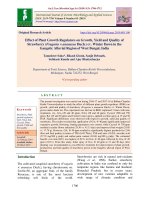
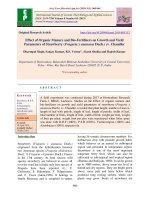
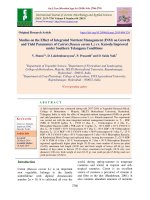
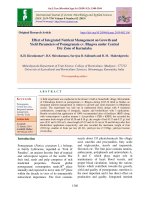


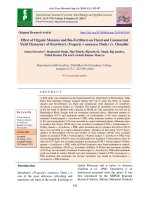
![Enhancement of plant stand establishment through seed priming and seed treatment on growth, seed yield and quality in foxtail millet [Setaria italica (L.) Beauv.]](https://media.store123doc.com/images/document/2020_03/12/medium_lnl1584024106.jpg)